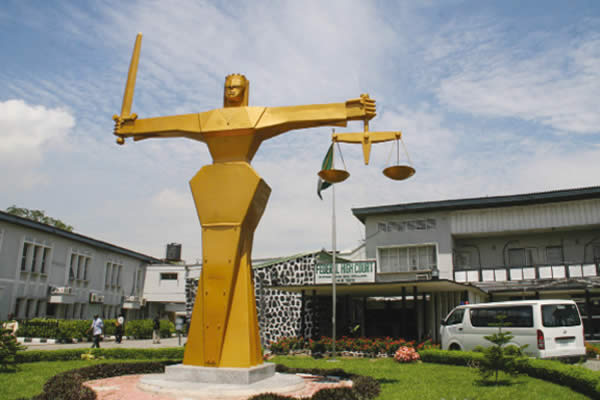A Federal High Court in Lagos is set to hear a significant case between Barbican Capital Limited and First Bank of Nigeria Holdings Plc, scheduled for October 21, 2024. The suit centers around an alleged dispute involving Barbican’s acquisition of shares worth N5.4 billion. The presiding judge, Justice Ayokunle Faji, adjourned the hearing after an application was made by Ecobank Plc to be joined in the case. During the proceedings, notable senior advocates entered appearances for each party involved: Koku for FBN Holdings, Olanipekun for Barbican, and Afolabi for the Central Bank of Nigeria, which had earlier been joined in the matter. Ecobank’s counsel emphasized the importance of their potential involvement and informed the court about their client’s application to join the case.
The hearing revealed various legal maneuvers as parties sought to regularize their processes and filings in response to the proceedings. Hakeem O. Afolabi, representing the Central Bank of Nigeria, informed the court that their processes were slightly filed out of time but requested an extension, which was granted without opposition. Such procedural complexities underline the intricate web of legal strategies at play in this dispute. Following this, Ecobank’s counsel registered their application for joiner and indicated that process had been duly served on Barbican, leading to a stalled discussion on recusal issues raised by Ogunba concerning the presiding judge.
As the court delves deeper into the case, it becomes evident that the issue of recusal could substantially affect proceedings. Earlier objections from the plaintiff’s counsel indicated that all matters pertaining to recusal should be discussed before moving forward with the main hearing. Justice Faji maintained that no progress would be made until the recusal matter was addressed, reflecting the procedural diligence required in such high-stakes litigation. Ogunba was granted time to file for the judge’s recusal, further delaying the hearings until the set date in October 2024.
The crux of Barbican Capital’s claims suggests a significant stake in FBN Holdings, asserting ownership of approximately 5.4 billion shares, accounting for 15.1 percent of the company’s total shared equity. However, Ecobank has contested this assertion, pointing to the legitimacy of funds used for purchasing these shares. According to Ecobank, the funds were allegedly misappropriated from the sale of Honeywell Flour Mills’ shares to Flour Mills of Nigeria Plc. The bank insists these maneuvers are part of a broader scheme devised by the Honeywell Group and its chairman, Dr. Oba Otudeko, intended to circumvent existing debts owed to Ecobank, which have been affirmed by a Supreme Court ruling.
The legal developments in this case shine a spotlight on both corporate governance and the responsibilities of companies to their creditors. The implications of this case not only affect the financial standing of Barbican Capital and FBN Holdings but also raise critical questions about compliance with financial regulations, corporate accountability, and the rights of shareholders. The upcoming hearing on October 21, 2024, is anticipated to bring to light the complexities surrounding corporate financing and the legal safeguards for investments as different financial actors navigate the intricacies of Nigerian corporate law.
This litigation encapsulates the dynamic and often contentious relationship between financial institutions and investment firms, particularly in a rapidly evolving market landscape. As further developments unfold in this case, stakeholders across the financial sector will be watching closely, given its potential ramifications on corporate financing practices and shareholder rights. The resolution of these legal disputes may set important precedents in the handling of similar cases in the future, underscoring the necessity for transparent dealings in the competitive sphere of corporate finance.


